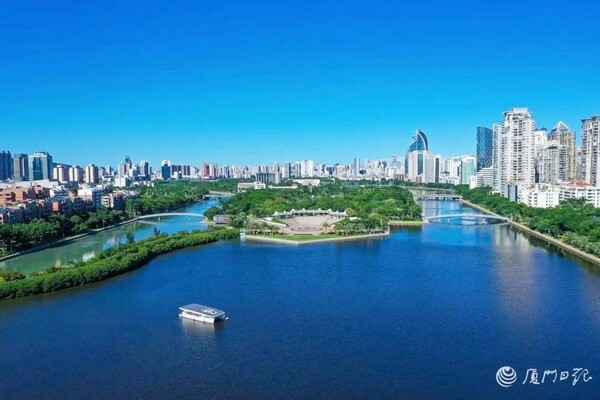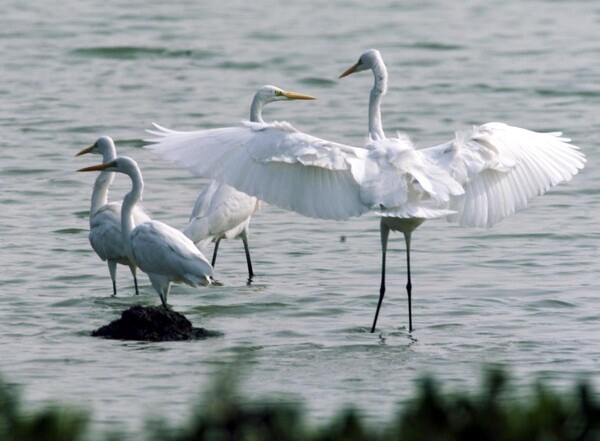By Zhao Yongping, Yan Ke, Wang Yinxin, People's Daily
Xiamen, capital of southeast China's Fujian province, with its many "green accolades" such as the UN-Habitat Scroll of Honor Award, International Garden City, and national-level ecological city, is a garden city that is beautiful and ecologically friendly.

The city's Yundang Lake, with its picturesque scenery, is known as an eco-signature of Xiamen.

However, the mesmerizing scenic spot today used to be a "stinky lake" that locals never wanted to come near.
With a water area of 1.6 square kilometers, the Yundang Lake was once an inner-bay fishing port. In the 1970s, it became an inner lake due to the seaward embankment. The rapid development of factories around the lake resulted in a large amount of sewage discharged directly into the lake, causing severe pollution.
"Back then, people passing by would run away quickly, covering their noses," said Chen Qingfu, a water quality administrator at the Yundang Lake conservation center.
At that time, the Xiamen Special Economic Zone was just established, and huge efforts were made to advance development, which led to a shortage of funds for environmental governance.
The pollution in Yundang Lake became a challenge for Xiamen - whether the city should sacrifice the ecological environment in exchange for economic growth and how it can strike a balance between development and environmental protection.
On March 30, 1988, Xi Jinping, who then served as Member of the Standing Committee of the CPC Xiamen Municipal Committee and executive vice mayor of Xiamen, convened a special meeting on strengthening the comprehensive treatment of the Yundang Lake, creatively putting forward the request to carry out law-based governance of the lake, intercept and treat sewage, dredge the lake and build embankments, revitalize the water and beautify the environment.
This marked the beginning of a transformation of the Yundang Lake.
The lake was then comprehensively managed by law. About half a year later, the Xiamen Municipal People's Congress adopted a motion on accelerating the comprehensive treatment of the Yundang Lake, which made clear the principles and direction of the governance.
Interception of sewage solved the problem of water quality from the source. Back then, there were 125 polluting enterprises by the lake. After a thorough investigation into them, many of these polluters were shut down, relocated or transformed as requested by the treatment plan.
In December 1991, just one week after the last batch of wastewater from an MSG plant was discharged to a pipe network, the water quality of Yundang Lake began improving.
However, it was difficult to further lift the water quality if the lake was not dredged over years of deposited pollutants. Therefore, the government launched large-scale dredging operations, followed by the construction of embankments, as well as the building of a lake island. This not only improved water quality, but also significantly enhanced flood control capabilities.
Besides, innovative efforts were made to connect the lake and the sea utilizing the sea's natural tidal difference. Sluice gates were installed in the seawalls to let water in during high tide and release water during low tide. At the same time, guide banks were built to circulate the water and effectively enhance the overall flood control and water exchange capacity of the lake area.
In order to restore the water ecology, since 1999, an initiative to restore the aquatic ecosystem has been underway along the shores of Yundang Lake through the experimental planting of mangroves. As the planting area gradually expanded, the marine ecosystem was revitalized, and water birds could once again be seen frolicking on branches.
The right approach produced immediate results. After three years of intensive efforts, the first phase of the comprehensive treatment of Yundang Lake was completed, achieving the goal of basically removing the foul smell from the lake. Improved water quality brought back egrets, and Xiamen's nickname - Egret Island - finally matched reality.
In 1992, a long-awaited dragon boat race was held on the Yundang Lake, joined by crowds of people. This was the best test of the achievements in the lake treatment.
The treatment of the Yundang Lake is not an overnight task. Over the past 30 years, Xiamen has adhered to the principle of the 1988 meeting and continuously promoted the governance of the Yundang Lake focusing on source control, intermediate reduction, and end treatment. Approximately 1.13 billion yuan ($158.72 million) has been invested in the first four phases of comprehensive treatment, and the fifth phase is currently being implemented.
According to data released by the Yundang Lake conservation center, the ecological improvement of the water environment in the lake area is significant. The concentration of ammonia nitrogen in the water body has decreased from 39.4 milligrams per liter in 1987 to 0.076 in 2022.
A total of 63 species of swimming organisms, 123 species of phytoplankton, 73 species of zooplankton, and 14 species of benthic organisms have been discovered in the lake area. Additionally, 95 species of birds have been recorded in the lake area. The Yundang Lake has become an ideal destination for migratory birds to winter each year, including cormorants.
"The water quality has improved year after year, and citizens have become happier and more satisfied with life," said Chen. According to him, in the past, most local residents would complain about the lake, but the Yundang Lake today is very popular.
"Many people come to inquire about the opening time of the sluice gates because they want to be there early to capture photos of the egrets," he told People's Daily.
Ecological advantages have become development advantages. Nowadays, the picturesque Yundang Lake area has attracted a large number of corporate headquarters and modern service enterprises, serving as an administration, finance, commerce, tourism, and residence center of Xiamen.
Ecology concerns the well-being of the people. How to handle the relationship between development and environmental protection is a global challenge. The remarkable transformation of the Yundang Lake is a vivid reflection of China's ecological progress.
Promoting harmony between humanity and nature is one of the essential requirements of Chinese modernization. China is pursuing high-quality development and high-level environmental protection simultaneously, adhering to the path of sustainable development that seeks win-win outcomes for both environment and development.
China respects nature, follows its ways, and protects it. Its practical exploration of the building of a beautiful China has offered replicable Chinese solutions to the rest of the world.

